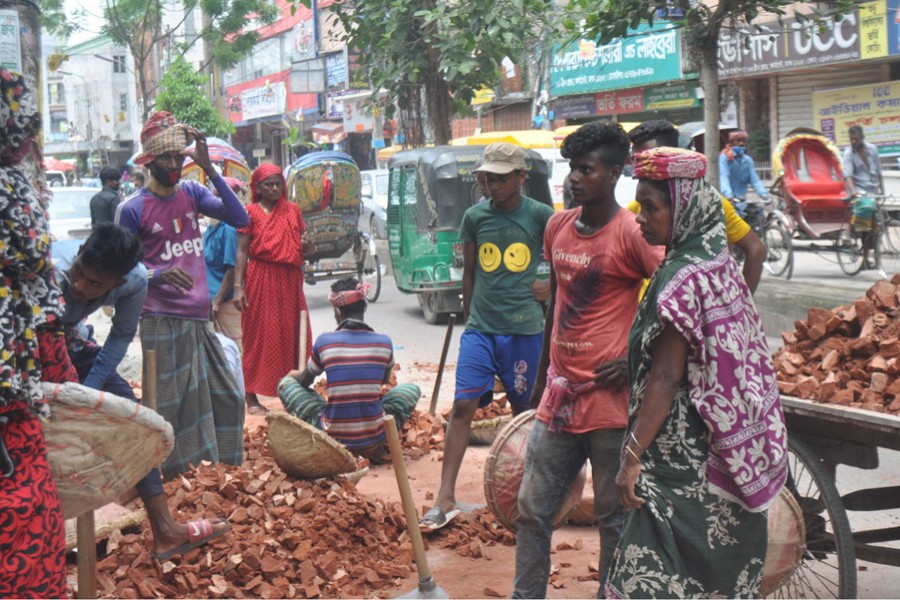As the coronavirus pandemic shows no signs of slowdown, livelihood of day labourers in the capital city becomes more vulnerable amid reduced economic activities, resulting in scarcity of work and fall in wages.
Many of these workers, dependent on daily incomes, had to leave the city in last two months due to sudden unemployment that took away their ability to pay for food and accommodations.
Day labourers like porters, masons, construction workers, rickshaw and van pullers etc may face dire situation further if the government doesn't adopt strong policy to ensure their food and health security, experts said.
Farida Begum, 40, who used to work in a group that crush brick, dig and move soil, and carry other materials at construction sites, was seen begging money on the street at Malibagh Chowdhurypara.
While talking to the FE she said, "I used to work at construction sites in different parts of the city on contract for day, week or even month and got paid daily after end of work, but there is no work."
Farida, mother of three children, now struggles to manage food for her family of six members as her husband, who also work in the same group, barely finds any work these days.
"We both earned Tk 1,000 to Tk 1,200 a day before the lockdown and usually found work four to five days a week, but now I beg while my husband (Alim Sardar) is in search of work," she said.
Another labourer Momen Sheikh, 45, who was seen working with his shovel at an internal road construction site at Mohanagar Housing Project in the city's West Rampura, said he started work a week ago for Tk 450 per day.
Previously, his wage would vary between Tk 600 and Tk 800 a day considering the type of work.
Momen mentioned that he was completely unemployed in April and May and went to his village home in Haimchar of Chandpur with his family in mid-May and returned to the capital in the first week of June.
Talking about reduction in wages, Mohammad Rasel, supervisor of the labourers at the construction site, said there are plenty of workers now and many are willing to work even below the wage they offer.
However, a group of 10-15 labourers was also seen waiting with their shovels, spades, baskets and other tools at around 9:20 am on Monday.
One of them, Md Tajul, 22, who worked as a cleaner at a restaurant before the pandemic, said he lost job in March and went to his village home at Saghata of Gaibandha before the lockdown started.
"There was no job for me after the paddy harvesting season was over around end of May; so, I came back to Dhaka after Eid and joined them (showing other labourers) to work on whatever I get," he said.
The labourers said people don't offer more than Tk 300 to Tk 500 in wages for a day which is almost half than before.
Dr Selim Raihan, executive director of South Asian Network on Economic Modeling (SANEM), said day labourers, especially in urban areas, who largely depend on daily incomes, are in more vulnerable situation due to job loss and having no savings.
Under its various social safety net programmes, the government has been supporting the people in need who belong to the existing list of the poor.
"In the budget for the fiscal year 2020-21, there was almost no allocation for the new poor who are going to live below poverty line," he added.
Many low-income people have already migrated to their respective villages but the rural economy does not have much to offer them as it depends on the flow of money from abroad and cities in the country, Dr. Raihan said.
Besides, oversupply of labourers will create pressure on the rural economy by decreasing wages, the economist noted.
Earlier on May 01, SANEM in its research report said the poverty rate in Bangladesh might rise to 40.9 per cent from existing 20.4 per cent due to the impacts of Covid-19 pandemic.
The report indicated that in addition to 34 million existing poor, there are another 36 million people who are 'non-poor' but can be categorised as vulnerable due to job and income loss.
According to a survey, conducted by BRAC during the period between March 31 and April 5 to assess the impacts of Covid-19 lockdown on earnings and food security of low-income people across the country, incomes of almost 62 per cent of day labourers have come down to zero.
Of them, 14 per cent have no food to eat at their home while 29 per cent have food for one to three days.
The survey also found that extreme poverty and poverty have already risen by 60 per cent and 54 per cent respectively.
Dr Hossain Zillur Rahman, chairperson of BRAC, said both cash and food assistance to low income people is important for dealing with the pandemic situation.
"The unemployed and the poor, who have lost their incomes, should be provided with monetary assistance along with other necessities," he added.


